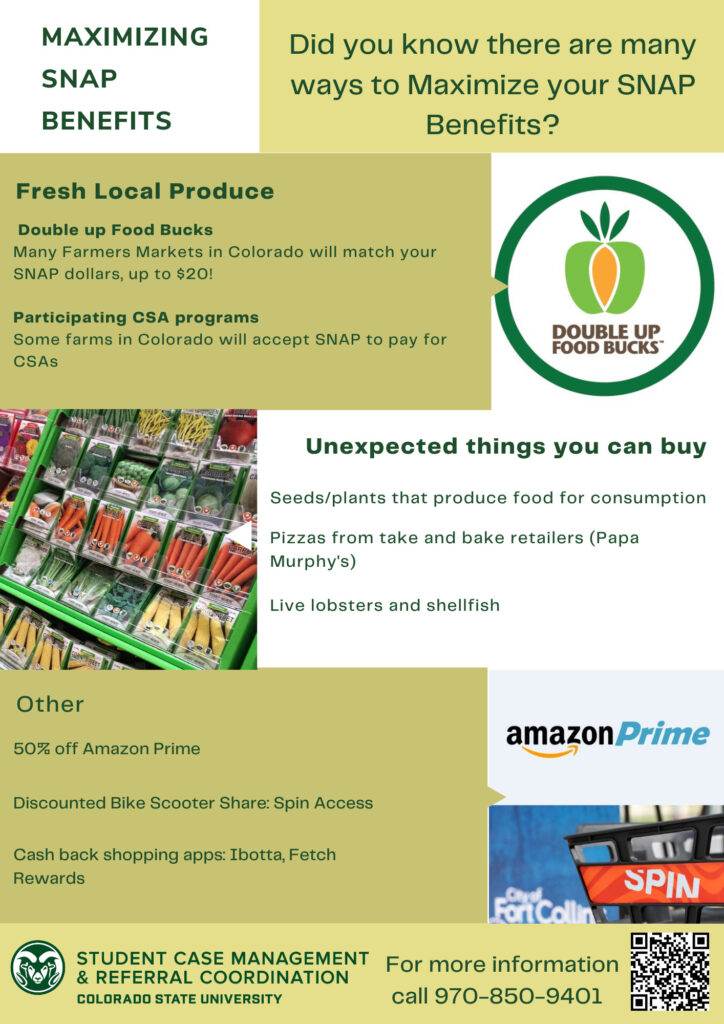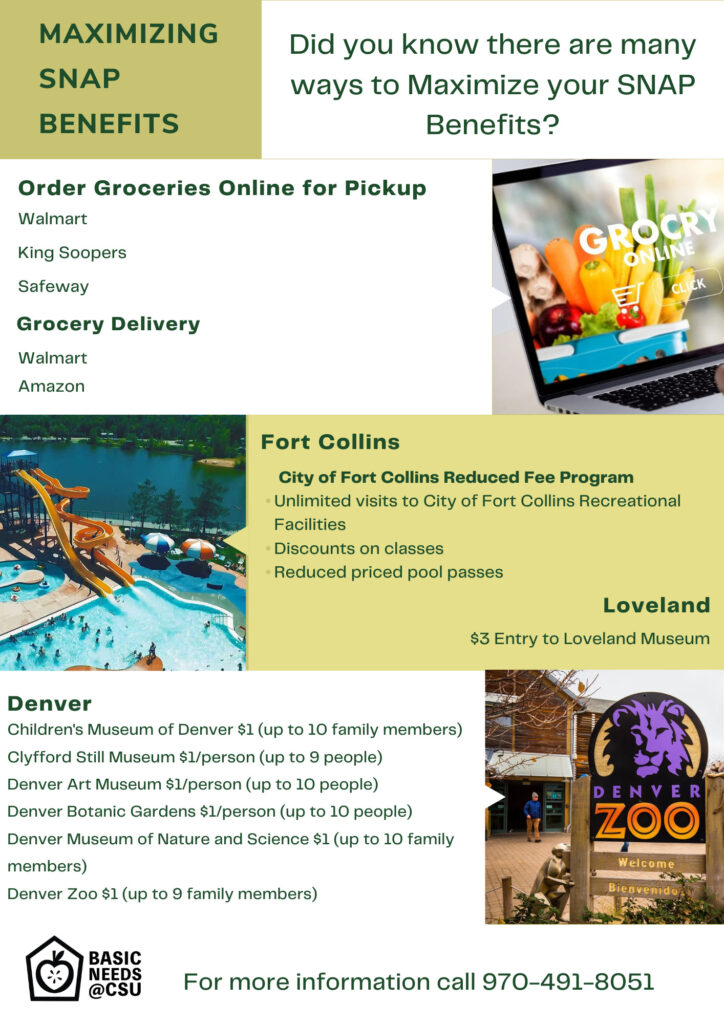Supplemental Nutrition Assistance Program (SNAP), formerly known as food stamps, can help eligible low-income families and individuals stretch their food budget! SNAP provides monthly supplemental income for food purchases for about 1 in 10 Coloradoans, including hard-working families, children, students, seniors, veterans and those who are disabled.
SNAP is a federal entitlement program, which means that granting one individual benefits will not take away from others who are eligible. If you and your family are in need, consider applying!
You and your family could receive up to the maximum allotment (based on household size)!
| HOUSEHOLD SIZE | GROSS MONTHLY INCOME LIMIT | MAXIMUM ALLOTMENT |
|---|---|---|
| 1 | $2,266 | $281 |
| 2 | $3,072 | $516 |
| 3 | $3,840 | $740 |
| 4 | $4,626 | $939 |
| 5 | $5,412 | $1,116 |
| 6 | $6,200 | $1,339 |
| 7 | $6,688 | $1,480 |
| 8 | $7,444 | $1,691 |
| Each Additional Member | +$758 | +$211 |
You must apply for SNAP in the state where you currently live. You apply for SNAP as part of a “household”. A household consists of everyone who lives together and purchases and prepares meals together.
An eligible household will receive an Electronic Benefit Transfer (EBT) card, which works like a debit card. Benefits are automatically loaded into your account each month. If your state agency determines that you are eligible, you will receive benefits back to the date you submitted your application.
In most cases, your state agency or local office will process your application within 7 – 30 days. During the 30 days, you may need to complete an eligibility interview and provide verification of the information provided on the application.
Online Purchasing Updates
As of May 2020, CO was approved to provide online purchasing with currently authorized SNAP online retailers! For up-to-date information on allowed benefits, delivery fees, locations, and delivery limitations for specific programs, please visit:
- Amazon Online Purchasing: www.amazon.com/snap
- Walmart Online Purchasing: https://grocery.walmart.com
- King Soopers: kingsoopers.com/hc/help/faqs
- Safeway/Albertson’s: safeway.com/shop/lp/snap-ebt-pay-at-pickup.html
You can also check the USDA directory for state-to-state approved purchasers.
When will you receive your benefits?
Once approved, benefits are sent out from the 1st to the 10th of every month, based on the last digit of your SSN.
If your:
| SSN ends in | Benefits available |
|---|---|
| 1 | 1st of the month |
| 2 | 2nd of the month |
| 3 | 3rd of the month |
| 4 | 4th of the month |
| 5 | 5th of the month |
| 6 | 6th of the month |
| 7 | 7th of the month |
| 8 | 8th of the month |
| 9 | 9th of the month |
| 10th of the month |
Families and Individuals
You may be eligible to receive SNAP benefits if you are:
- Working for low wages or working part-time;
- Unemployed;
- Receiving welfare or other public assistance payments
- Elderly or disabled and are low-income, or
- Homeless
Factors to Consider:
Work requirements: With certain exceptions, able-bodied adults between 16 and 60 years of age must register for work, accept an offer of suitable work, or take part in an employment and training program (exceptions include children, seniors, pregnant women, and individuals with disabilities).
Income Guidelines: Most households must have income at or below certain dollar limits before and after deductions. Both Gross and Net Income limits are factored into eligibility (see Larimer County SNAP Income Limits).
Certain exemptions apply to those households receiving other forms of aid (Supplemental Security Income (SSI) and Temporary Assistance for Needy Families (TANF)) or with people age 60 or older or disabled.
Citizenship Status: You must be a U.S. citizen or legal permanent resident to receive SNAP benefits. There are certain exceptions made for refugees, asylees, and children. Children of undocumented immigrants can receive food stamps if they are citizens or legal permanent residents.
Social Security Number: Everyone in the household that is applying for benefits must have or apply for a Social Security number. A household member that does not have a Social Security number can choose not to apply for benefits and be treated as a non-applicant.
Students: University students (6 or more credits for undergraduate students & 5 or more credits for graduate/professional students) may be eligible by meeting additional student eligibility criteria. See Student Eligibility Guidelines below or contact us for more info!
Student Eligibility Guidelines
You might qualify for SNAP if you meet any of the following criteria:
- Work 80 hours/month (either on or off-campus)
- Participate in work-study/have a work-study position (number of hours don’t matter)
- Are a Parent or Caregiver
- Receive TANF Benefits
- Have a Disability that Makes Working Challenging
- Participate in a Workforce Development Program
Students (18-49) attending college at least half-time* may be eligible by income guidelines and one of the above additional criteria
Students attending college less than half-time* and those age 50+ do not need to meet additional student criteria (only income)
Factors that may impact eligibility:
- If your meal plan pays for more than half of your meals per week, you are not eligible for SNAP
- If you are under the age of 22 and living with parent or guardians, you must apply for SNAP as part of their household.
- If you are on a break from school, you must still meet the criteria that make you eligible for SNAP
- If you are receiving benefits through the VA or private scholarships, they may count for income.
We are here to answer your question and help you navigate the benefit process. This service is available to CSU students, faculty and staff!
For more information email SNAP4Rams@colostate.edu or call us at (970) 491-8051.
In most cases, individuals will be required to renew their benefits every 6 months. This is an important step in completing your benefits. The county will contact you when you are up for renewal.
You can renew via your PEAK account or, if you need assistance, with one of our SNAP4Rams representatives! Just schedule an appointment by clicking below.

